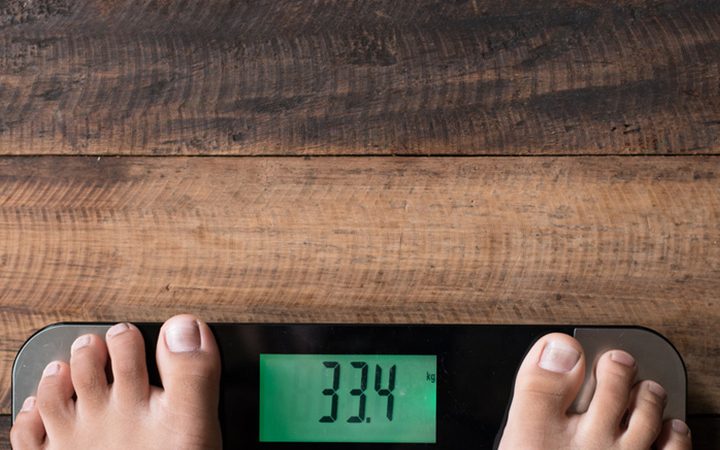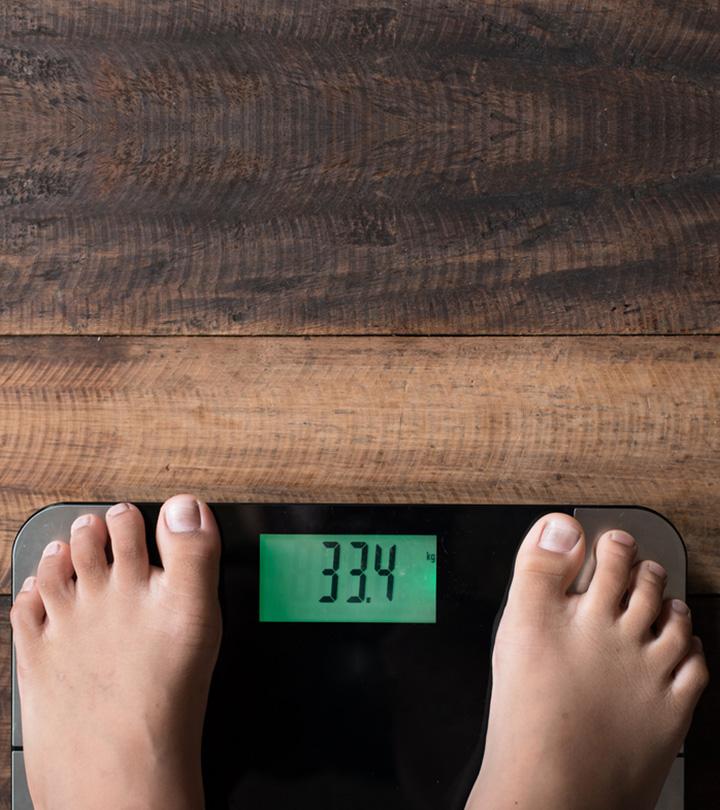A child is underweight if their body mass index (BMI) is below the 5th percentile for weight compared to their height. Since childhood is the age of growth and maturation, being underweight at this stage may hinder development. Hence, a child needs enough nutrients to ensure healthy growth for their age (1).
There could be many reasons why a child is underweight. The solution is identifying the cause and modifying the child’s nutrition by including calorie-rich and nutrient-dense foods in their diet. Read on to know what causes a child to be underweight and how to gain weight for kids.
Why Is A Child Underweight?
A child may be underweight either due to an underlying health issue or other factors that impede the child’s daily intake of calories. These reasons may include the following (2)(3).
- Less daily calorie intake due to general disinterest in eating
- Insufficient calories for the body due to increased physical activity
- Parent’s lack of knowledge of the child’s daily calorie requirement
- Diluted supplement preparations in case the child is on supplements
- Underlying eating disorders such as anorexia nervosa
- Inability to swallow due to neurological or oral sensitivity issues
- Metabolic disorders that affect the conversion of food into energy such as galactosemia or phenylketonuria
- Malabsorption due to diseases such as cystic fibrosis, Crohn’s disease, or celiac disease
- Food allergies or intolerances that cause gastrointestinal disturbances
- Childhood stress and trauma leading to disinterest in food
- Chronic or recurring infections or diseases
What Happens If A Child Doesn’t Gain Weight?
A child who struggles to keep up with the growth pattern as per their age could be diagnosed with failure to thrive (FTT). This diagnosis would be made by a healthcare provider. FTT could lead to (4):
How To Help A Child Gain Weight?
The ideal treatment to help a child gain weight depends on treating the underlying cause. The following tips, including minute changes to their everyday food patterns, could be used alongside the treatment for better results (5)(6).
- Provide your child with a balanced diet containing all five food
- Base their meals on complex carbohydrate-rich foods such as potatoes, pasta, bread, or rice.
- Prevent them from skipping their meals.
- Avoid making the meals bulky. Six to eight small meals or snacks per day are more suitable considering a child’s appetite.
- Mix milk in pasta or soups to increase its calorie content.
- Encourage healthyprotein-filled foods during their snack times, such as trail mix.
- Substitute low-fat milk with whole milk or whole-milk yogurt for increased calorie intake.
- Add cheese to recipes wherever you can.
- Top-up fruits, pancakes, or waffles with heavy cream and dry fruitsfor some extra calories.
- Add powdered milk to any recipe for additional
- Include a cheese dip on the side with vegetable salads.
- Provide them fruit smoothies, milkshakes, or whole nuts or nut butters, which are calorie-dense.
- Substitute oils with butterand non-hydrogenated margarine in a few recipes.
- Use avocados and fresh fruits on toasts and sandwiches.
- Consider meats with healthy fat content.
You may also provide the child with any supplements or protein powder prescribed by the doctor for weight gain. Administering supplements to a child is not advised unless suggested by your healthcare provider or your dietitian (1) (7). A dietician could also help create a specialized diet plan to meet the right calorie requirement for your child’s age.
Besides these interventions, the following lifestyle changes could help a child eat food with interest and without any distractions, potentially improving the number of calories they consume.
- Eat meals together as a family
- Keep mobile screens away and TV off during meals
- Maintain a regular meal time
- Avoid low-nutrient, high-calorie foods such asjunk food or soda/soft drinks
- Encourage healthy food habits such as eating a balanced diet
Optimal weight gain in children is a symbol that the body is receiving the nutrients it needs. Parents may maintain a growth chart for their children to check if they are gaining weight appropriately for their age. If your child has an underlying eating disorder, visit a specialist to treat or manage the problem so that the child can receive adequate calories through the food they eat.
References:
MomJunction’s articles are written after analyzing the research works of expert authors and institutions. Our references consist of resources established by authorities in their respective fields. You can learn more about the authenticity of the information we present in our editorial policy.
- A Dietitian’s Best Advice If Your Child Is Underweight.
https://health.clevelandclinic.org/dietitians-best-advice-child-underweight/ - 10 Possible Reasons Why Your Child Isn’t Growing?
https://health.clevelandclinic.org/10-possible-reasons-why-your-child-is-not-growing/ - Slow Weight Gain In Infants And Children.
https://www.childrenshospital.org/conditions-and-treatments/conditions/s/slow-weight-gain-in-infants-and-children/symptoms-and-causes - Failure To Thrive (FTT) In Children.
https://www.stanfordchildrens.org/en/topic/default?id=failure-to-thrive-90-P02297 - How To Help Your Child Gain Weight.
https://www.stjude.org/treatment/patient-resources/caregiver-resources/patient-family-education-sheets/nutrition-dietary/how-to-help-your-child-gain-weight.html - How Can I Help My Child Gain Weight?
https://www.unlockfood.ca/en/Articles/Childrens-Nutrition/Children%E2%80%99s-Nutrition-Raising-Healthy-Kids/How-Can-I-Help-My-Child-Gain-Weight.aspx - Does My Child Need A Supplement?
https://www.eatright.org/food/vitamins-and-supplements/dietary-supplements/does-my-child-need-a-supplement
Recommended Articles
- ADHD Medications For Children: Dosage, Side Effects, And Precautions
- What Age Should A Child Get A Phone? Uses, Benefits, And Side Effects
- Depression In Children: Types, Symptoms, Causes, Treatment, And Prevention
- Autism Spectrum Disorder In Children: Types, Causes, Treatment And Prevention
The following two tabs change content below.




































